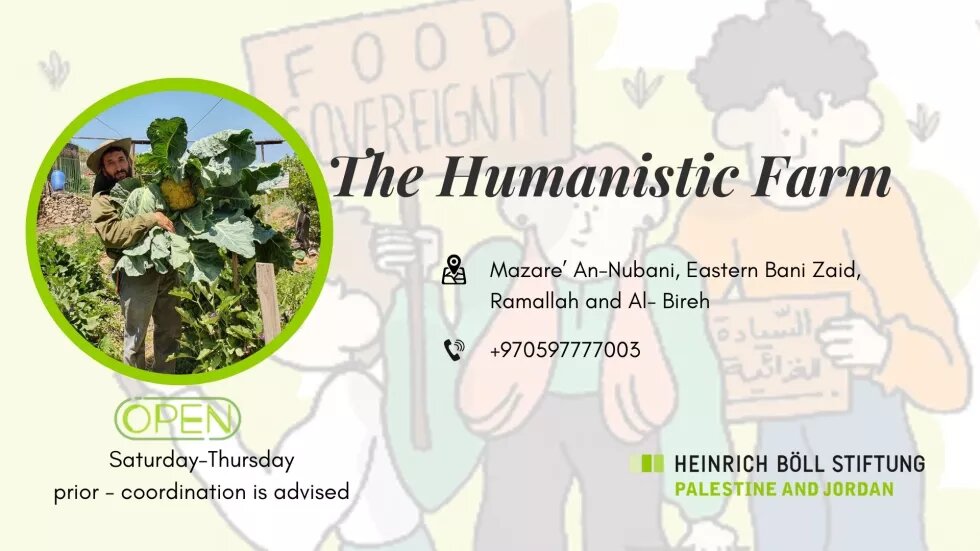
The Humanistic Farm is one of the farms that shared their story with us, in which Saad Dagher describes the beginnings of his journey with agroecology and how he introduced the concept and implemented it in Palestine.
With my early introduction to agroecology and the establishment of the first agroecological farm Palestine in 2002, using the technique of raised beds, I began to train and promote this type of agriculture. I became fully acquainted with the term “Agroecology” in 2003. I conducted training for farmers and women in their agricultural fields in an attempt to convince people of this agricultural approach. The persuasion process was not easy.
In 2005, during a training provided to farmers in Jenin and while trying to persuade them to stop using chemical poisons, the need for a more “humane” farming was raised by the farmers. The concept of humane agriculture emerged then, and years later, the "humanistic farm" was established to embody the idea.
The beginnings of the establishment of the farm was in 2010 with the first attempts being held in the second section of the farm, the one with olive and fruit trees. In 2014, first section, the seasonal vegetables section, was planted after rehabilitation and rebuilding of sanasel (stone terraces). The Humanistic Farm’s vegetable section is a 2-dunum piece of land while the olive grove section is 10 dunums. Although cultivation at the farm is seasonal (i.e. planting crops suitable for each particular season), farming is continuous all year-round whereby not a single day passes during the year without agricultural production. This is attributed to the agroecological approach of production and care of the land.
On the farm, different chemical-free vegetables are produced according to the season. In the summer and autumn seasons, products such as peppers, tomatoes, cucumbers, zucchinis, beans, cowpeas, eggplant, purslane/fumitory, mallow, and basil are available. Raspberries will be an additional product we will plant in this season. During winter and early spring, products such as lettuce, cabbage in its different varieties, cauliflower, spinach, green onions, watercress, cilantro, celery, potatoes, dill, dandelion, radish, asparagus, pomegranate, and walnuts are available. From the olive section of the farm, I produce green olives, olive oil, green and dry thyme, and sage. I am currently working on adding fig trees, grape vines, sweet apple trees as well as some other stone fruits to this section. On the other hand, the farm started producing local and baladi (heirloom) seeds of some crops, with the aim of reaching a closed production circle and full self-reliance. Among these seeds are cowpeas, cucumbers, zucchinis, hawks, tomatoes, eggplants, peppers, and beans.
The farm depends on marketing its produce through a direct selling system on the farm and in the village, ensuring a fair price for both the farmer and the consumer. In many cases, people place their orders ahead of the harvest, which shows their trust in the farmer and the high-quality chemical-free produce
The farm represents a model in the region that inspires many people including youth. A significant number of people have begun to practice agroecology, inspired by this model of self-reliance in food production, using local inputs. Therefore, the farm plays an essential role in the region and Palestine in terms of introducing innovative methods of agroecological production and utilizing every square meter to produce food. Additionally, it plays an important role in coordinating between farmers in the region to exchange ideas, experiences, and seeds. It also provides a practical model to benefit from the water of natural springs, which is often lost without use. This is especially the case in the village where the farm is located and other surrounding villages, where there are about twenty natural springs. Everything that the farm has to offer goes towards providing an integrated model in food sovereignty.
What also distinguishes the farm is its location, as it is situated in an attractive ecological area falling between two natural water springs. The farm organizes educational and eco-tourism tours, as there are several hiking trails in the area surrounding the farm as well as historical sites, an old town, and many springs.
The farm is also equipped to host groups and organizations to hold workshops in an outdoor open space away from offices. The farm is also currently being developed to be suitable for camping, organizing educational summer and winter camps, , as well as training courses in agroecology, rain-fed agriculture, water harvesting, nature restoration, the natural farming method of Masanobu Fukuoka, baladi seed production, holistic olive grove management, and beekeeping.
__________________________________________
Products Selling Points: The produce is mainly sold in the village (Eastern Bani Zaid) and upon order.
Product Availability:
Seasonal products are available throughout the year and include various vegetable products. Olives and olive oil during olive season and some types of fruits are also available.
Volunteering opportunities:
The farm needs volunteers at the beginning of spring (March) to maintain raised beds, distribute farm manure/ compost, maintain the irrigation network and preparation for spring/summer season, and in rebuilding walls that are usually destroyed in the winter due to slopes. Then volunteers are also needed during June, July, and August, for the harvesting period and for planting some new crops. The last volunteering period is the end of September until mid-November (planting winter vegetables, picking olives).
Other services:
- Organizing educational and eco-tours in the farm area in addition to historical sites, the old town, and natural springs.
- Hosting groups and organizations for workshops.
- The possibility of organizing educational summer camps and providing training courses on topics related to chemical-free agriculture and integrated food production systems within the principles of food sovereignty.